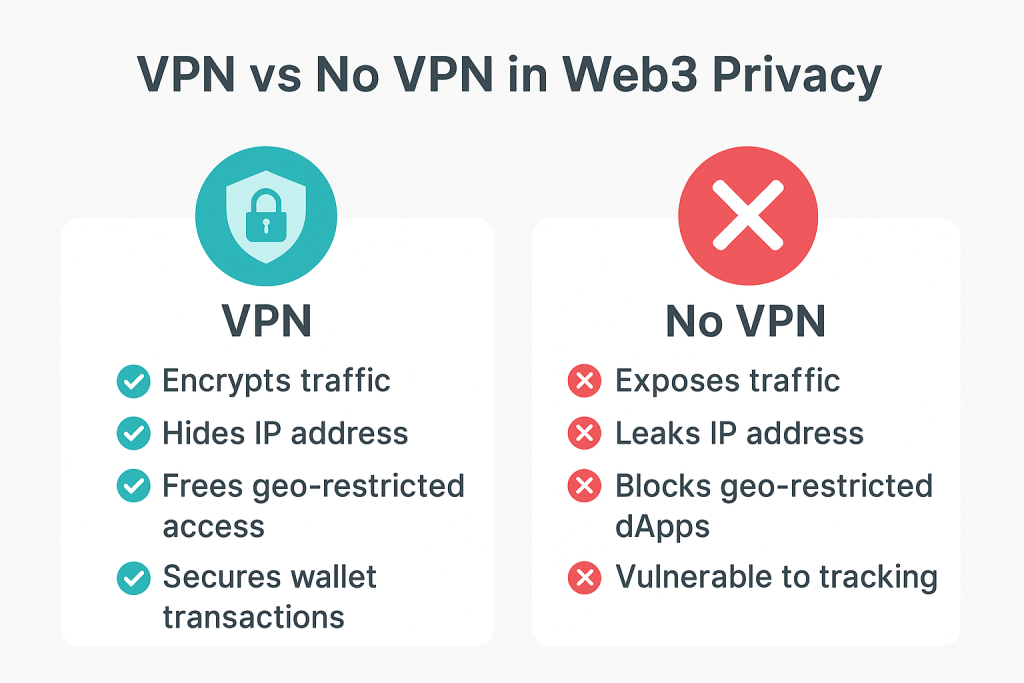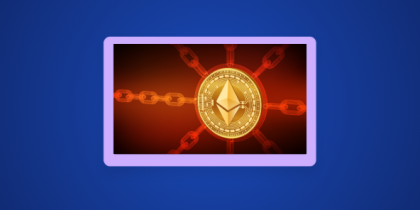As the internet evolves from centralized platforms to decentralized ecosystems, Web3 has emerged as a game-changing movement redefining how users interact, own data, and transact online. It’s built on blockchain, smart contracts, and cryptographic protocols but while Web3 solves the problem of central authority, it still faces a critical challenge: privacy and security at the network level.
This is where a VPN (Virtual Private Network) becomes essential. Whether you’re accessing decentralized exchanges, staking crypto, or exploring dApps, using a VPN for Web3 ensures that your identity, IP address, and connection data remain invisible to prying eyes. Let’s explore this in detail and understand how a VPN empowers the decentralized web.

Understanding the Web3 Landscape
Web3, often referred to as the decentralized web, is designed to eliminate intermediaries putting control back into the hands of users. Instead of depending on platforms like Google or Meta, users interact directly with decentralized applications (dApps) hosted on blockchain networks such as Ethereum, Solana, or Polkadot.
But even though Web3 offers decentralized ownership, it doesn’t mean you’re fully anonymous. When you connect to a blockchain node, use a crypto wallet, or access DeFi services, your IP address and network metadata can still reveal:
- Your approximate geographic location.
- The time and frequency of your transactions.
- Potentially, even your on-chain activity patterns.
This metadata can be used by ISPs, analytics tools, or surveillance nodes to deanonymize you.
That’s why a VPN for Web3 isn’t just an add-on it’s a foundation for preserving privacy in a trustless environment.
Why Web3 Needs a VPN
Even though blockchain transactions are encrypted and pseudonymous, the network layer remains vulnerable. Without a VPN, your internet service provider (ISP) can still monitor and log your traffic to blockchain nodes or crypto services.
Here’s how a VPN changes that:
| Risk Without VPN | VPN Protection Benefit |
|---|---|
| ISP monitors blockchain or exchange access | VPN encrypts traffic and hides destination |
| Nodes identify your IP | VPN masks your IP with an encrypted tunnel |
| Geo-blocked dApps or Web3 platforms | VPN unlocks decentralized apps globally |
| Public Wi-Fi risks while accessing wallets | VPN shields from man-in-the-middle attacks |
| Government or ISP restrictions on blockchain | VPN bypasses censorship and firewalls |
By routing your connection through encrypted VPN servers, all your Web3 traffic appears anonymous even your ISP can’t see what blockchain or node you’re connected to.
How a VPN Strengthens Web3 Security
To understand how VPNs integrate with Web3, you need to look at three layers of protection:
1. Anonymity through IP Masking
When you access dApps or Web3 marketplaces like OpenSea or Uniswap, your real IP address gets replaced by the VPN server’s IP. This ensures no network node or analytics tracker can associate your blockchain activities with your real-world identity.
2. Encryption of Node Connections
If you run your own node or interact with Ethereum or Solana APIs, a VPN encrypts these connections. This prevents ISPs from throttling or blocking blockchain-related traffic a common issue in restrictive regions.
3. Bypassing Geo-Restrictions
Certain decentralized applications (especially early-stage or regulatory-bound ones) may restrict users by region. A VPN with global servers like PureVPN, allows you to connect through countries where these dApps are accessible, ensuring full participation in Web3 ecosystems.

Using PureVPN for Web3
PureVPN provides the ideal framework for users looking to protect their decentralized identities. Here’s how it fits perfectly within the Web3 environment:
- Global Network Access: PureVPN operates thousands of servers across 65+ countries, ensuring seamless access to Web3 tools, regardless of regional limitations.
- AES-256 Encryption: Your data packets from wallet logins to node interactions remain fully encrypted end-to-end.
- Dedicated IP Feature: Running your own Web3 node or hosting a decentralized application? PureVPN’s dedicated IP feature ensures stability and trust for repeated blockchain connections.
- No-Log Policy: A must-have for crypto users, PureVPN guarantees zero retention of browsing or blockchain activity logs.
By combining PureVPN’s encryption with blockchain’s decentralization, users get complete sovereignty not only over their assets but also their data trail.
Setting Up a VPN for Web3 Access
Here’s how you can configure your VPN to start using Web3 services securely:
- Choose a Trustworthy VPN Provider
Select a VPN with a strong privacy policy and advanced encryption standards. Avoid free VPNs since they often log and sell user data. - Connect to an Optimal Server
Choose a location close to the blockchain node or region where the dApp is accessible. For instance, if a service is restricted in your country, connect to a VPN server in a crypto-friendly nation like Switzerland or Singapore. - Launch Your Web3 Wallet or dApp
Open MetaMask, Phantom, or any other wallet once your VPN is active. All node and RPC requests will now flow through the encrypted VPN tunnel. - Interact Securely with DeFi or NFTs
Whether you’re swapping tokens, staking assets, or minting NFTs, your activities remain shielded from network-level surveillance.
Common Web3 Use Cases Where VPNs Help
| Use Case | VPN Advantage |
|---|---|
| Accessing restricted DeFi apps | Unlock global access to liquidity pools and staking platforms. |
| Running blockchain nodes | Protect node IP and prevent DDoS or throttling. |
| Interacting on public Wi-Fi | Secure Web3 wallets from potential man-in-the-middle attacks. |
| Exploring DAOs and communities | Avoid geo-blocked governance platforms or regional restrictions. |
The Future: Privacy Layers in Web3
The next stage of Web3 will blend privacy layers and decentralized VPNs (dVPNs) into blockchain infrastructure. Protocols like Sentinel, Orchid, and Mysterium are building decentralized VPN frameworks, but until they’re mainstream, reliable centralized VPNs like PureVPN remain the practical solution for privacy-conscious users.
In a future where data sovereignty equals financial freedom, VPNs serve as the bridge between Web2 privacy expectations and Web3 decentralization goals.
Final Thoughts
Web3 promises a more open, user-owned internet but it doesn’t inherently guarantee privacy. Network surveillance, IP leaks, and geo-blocks still threaten decentralization’s core values.
By using a VPN for Web3, users reinforce these principles, ensuring that anonymity, accessibility, and data freedom remain intact. Whether you’re minting tokens, staking assets, or building dApps, a VPN like PureVPN adds the missing privacy layer that Web3 alone can’t yet deliver.
Frequently Asked Questions
Even though Web3 is decentralized, your internet connection is not. A VPN hides your IP address, encrypts all traffic to blockchain nodes or dApps, and prevents ISPs or analytics trackers from profiling your activity. It adds the missing privacy layer that Web3 protocols alone can’t provide.
Yes. A VPN prevents network-level attacks like IP leaks, DDoS, or man-in-the-middle interceptions which are common when accessing decentralized services over public Wi-Fi. It ensures that even though your transactions are public on-chain, your identity and network origin remain private.
Slightly, yes but not in a way that disrupts performance. Using premium services like PureVPN, which offer high-speed protocols like WireGuard and globally optimized servers, ensures minimal latency while maintaining complete encryption and anonymity.
Yes, VPN use is legal in most jurisdictions. It’s primarily a privacy and security tool, not a method to break regulations. However, if a Web3 project explicitly bans users from certain regions, bypassing those restrictions may violate their terms of service not legal codes. Always review project policies first.








